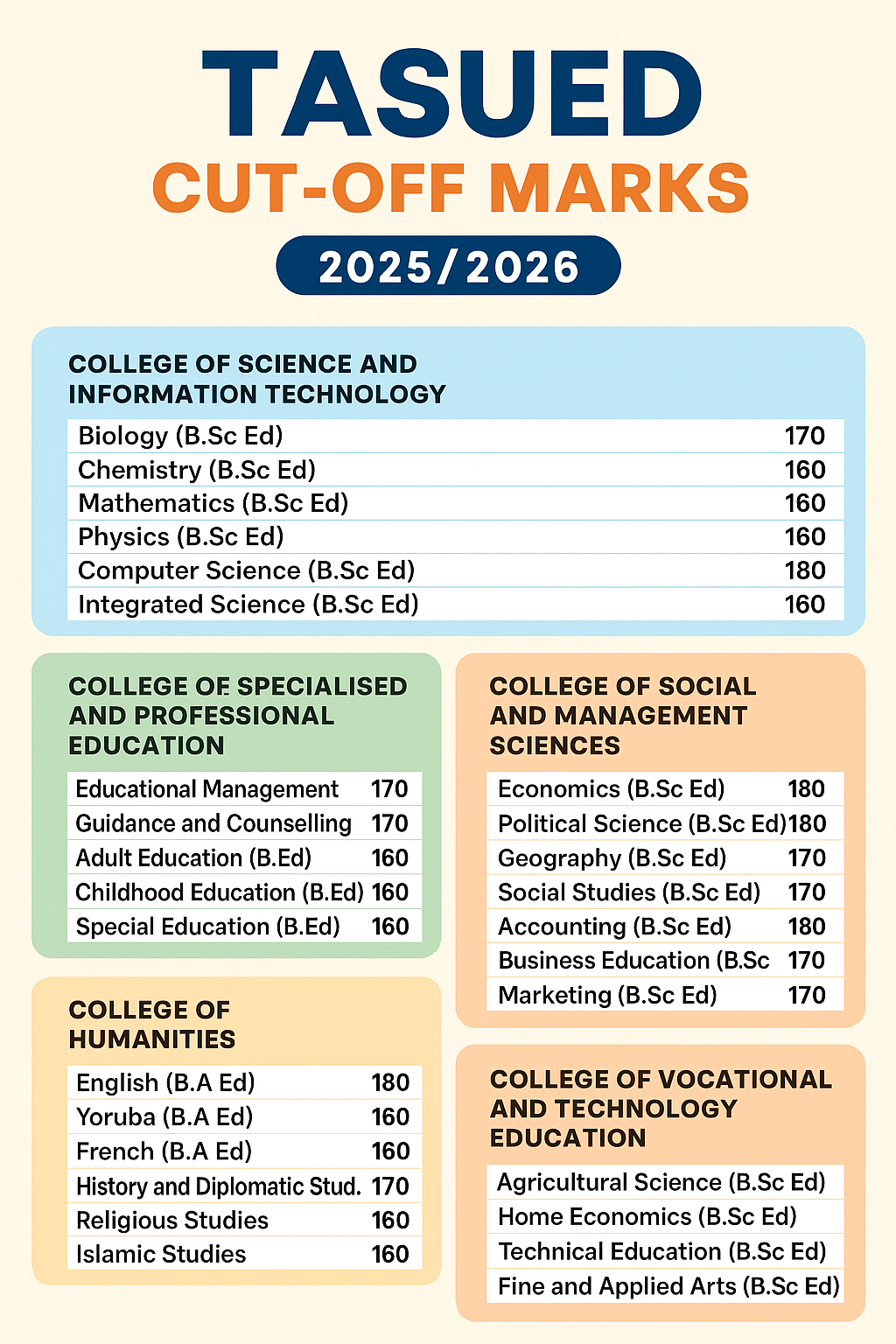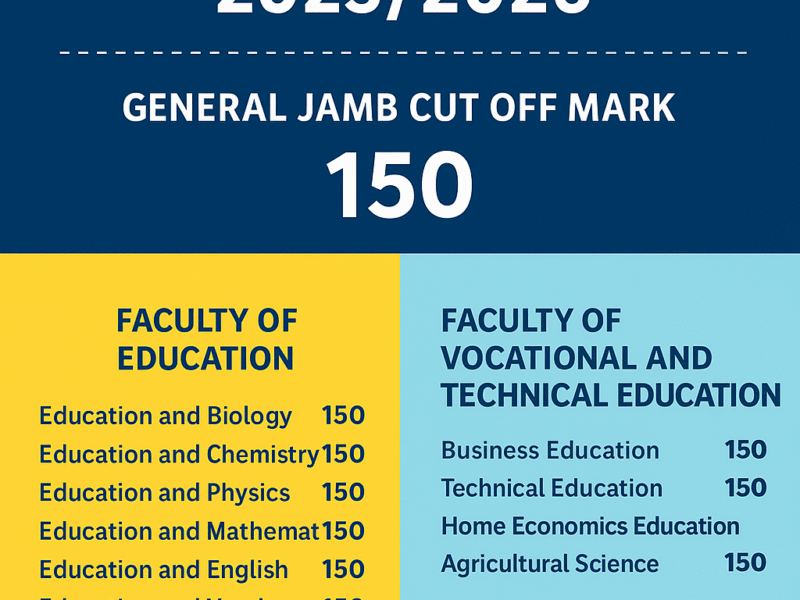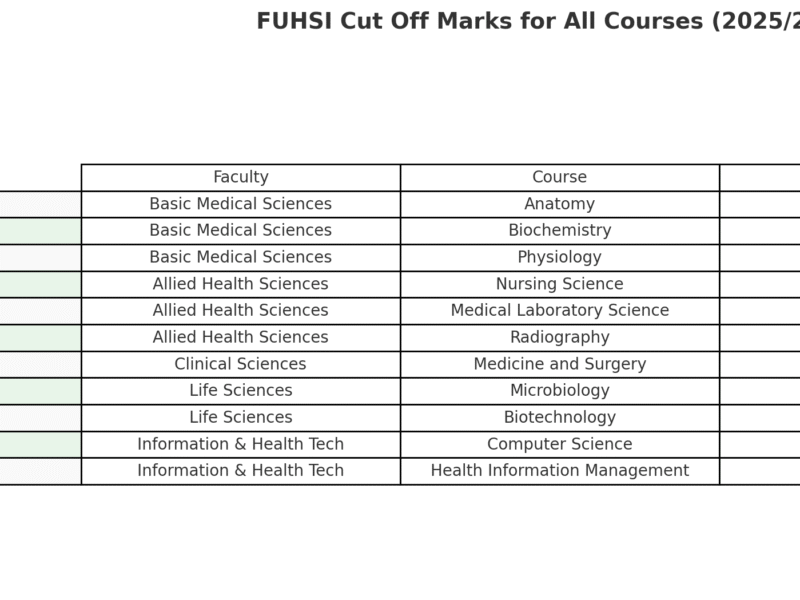Are you planning to study at Tai Solarin University of Education (TASUED) in the 2025/2026 academic session? One of the most important things you must know before applying is the cut-off mark for your chosen course.
This guide explains the general cut-off mark, departmental cut-off marks, admission requirements, and tips to boost your chances of gaining admission into TASUED.
Contents
- General Cut-Off Mark for TASUED (2025/2026)
- General Admission Requirements for TASUED
- TASUED Departmental Cut-Off Marks (2025/2026)
- College of Science and Information Technology (COSIT)
- College of Specialised and Professional Education (COSPED)
- College of Social and Management Sciences (COSMAS)
- College of Humanities (COHUM)
- College of Vocational and Technology Education (COVTED)
- Most Competitive Courses in TASUED
- How TASUED Calculates Screening Score
- O’level Grading System:
- Tips to Boost Your Admission Chances
- What to Do If You Score Below the Cut-Off
- Frequently Asked Questions (FAQs)
General Cut-Off Mark for TASUED (2025/2026)
- The official minimum JAMB score required: 150.
- Candidates who score 150 and above and choose TASUED as their first choice are eligible to apply for the post-UTME screening.
- Note: Some competitive courses require a higher score (170–180+).
General Admission Requirements for TASUED
To qualify for admission into TASUED, you must:
- Score at least 150 in JAMB.
- Choose TASUED as your first choice institution.
- Be at least 16 years old.
- Have at least five O’level credits (including English and Mathematics).
- Upload your O’level results on JAMB CAPS.
TASUED Departmental Cut-Off Marks (2025/2026)
Here’s the breakdown by faculty/college:
College of Science and Information Technology (COSIT)
| Course | Cut-Off Mark |
|---|---|
| Biology (B.Sc Ed) | 170 |
| Chemistry (B.Sc Ed) | 160 |
| Mathematics (B.Sc Ed) | 160 |
| Physics (B.Sc Ed) | 160 |
| Computer Science (B.Sc Ed) | 180 |
| Integrated Science (B.Sc Ed) | 160 |
College of Specialised and Professional Education (COSPED)
| Course | Cut-Off Mark |
|---|---|
| Educational Management (B.Ed) | 170 |
| Guidance & Counselling (B.Ed) | 170 |
| Adult Education (B.Ed) | 160 |
| Childhood Education (B.Ed) | 160 |
| Special Education (B.Ed) | 160 |
College of Social and Management Sciences (COSMAS)
| Course | Cut-Off Mark |
|---|---|
| Economics (B.Sc Ed) | 180 |
| Political Science (B.Sc Ed) | 180 |
| Geography (B.Sc Ed) | 170 |
| Social Studies (B.Sc Ed) | 170 |
| Accounting (B.Sc Ed) | 180 |
| Business Education (B.Sc Ed) | 170 |
| Marketing (B.Sc Ed) | 170 |
College of Humanities (COHUM)
| Course | Cut-Off Mark |
|---|---|
| English (B.A Ed) | 180 |
| Yoruba (B.A Ed) | 160 |
| French (B.A Ed) | 160 |
| History & Diplomatic Studies (B.A Ed) | 170 |
| Religious Studies (B.A Ed) | 160 |
| Islamic Studies (B.A Ed) | 160 |
College of Vocational and Technology Education (COVTED)
| Course | Cut-Off Mark |
|---|---|
| Agricultural Science (B.Sc Ed) | 170 |
| Home Economics (B.Sc Ed) | 160 |
| Technical Education (B.Sc Ed) | 160 |
| Fine & Applied Arts (B.Sc Ed) | 170 |
Most Competitive Courses in TASUED
The following courses require higher JAMB scores (180+) because of their demand:
- Computer Science Education
- Accounting Education
- English Education
- Economics Education
- Political Science Education
How TASUED Calculates Screening Score
TASUED does not conduct post-UTME exams. Instead, it uses a grading system based on JAMB and O’level results.
O’level Grading System:
- A1 = 10 points
- B2 = 9 points
- B3 = 8 points
- C4 = 7 points
- C5 = 6 points
- C6 = 5 points
👉 Your total screening score is calculated by adding JAMB + O’level points.
Tips to Boost Your Admission Chances
- Make TASUED your first choice only.
- Upload O’level results early on JAMB CAPS.
- Pick courses that match your JAMB score strength.
- Keep phone/email active for updates.
- Monitor TASUED portal: tasued.edu.ng.
What to Do If You Score Below the Cut-Off
- Apply for a less competitive course.
- Do a change of course on JAMB portal.
- Consider part-time or NCE programmes.
- Re-sit JAMB next year and aim higher.
Frequently Asked Questions (FAQs)
1. What is TASUED’s general cut-off mark for 2025/2026?
👉 The general JAMB cut-off mark is 150.
2. Does TASUED accept second choice candidates?
👉 No, you must choose TASUED as first choice.
3. Is there post-UTME exam in TASUED?
👉 No written exam. TASUED uses screening method (JAMB + O’level).
4. Can I gain admission with two sittings in O’level?
👉 Yes, TASUED accepts two sittings for most courses.
5. Which courses are the most competitive in TASUED?
👉 English Education, Computer Science Education, Accounting, Economics, Political Science.
6. Can I change my course after applying?
👉 Yes, but you must do it on JAMB portal before TASUED closes registration.
Admission into TASUED is straightforward if you understand the cut-off marks and screening process. Scoring 150 and above gives you eligibility, but for competitive courses, you should target 180+.
Stay updated on TASUED’s official portal, choose wisely, and apply early to secure your admission.
Good luck with your TASUED journey! 🎓✨



